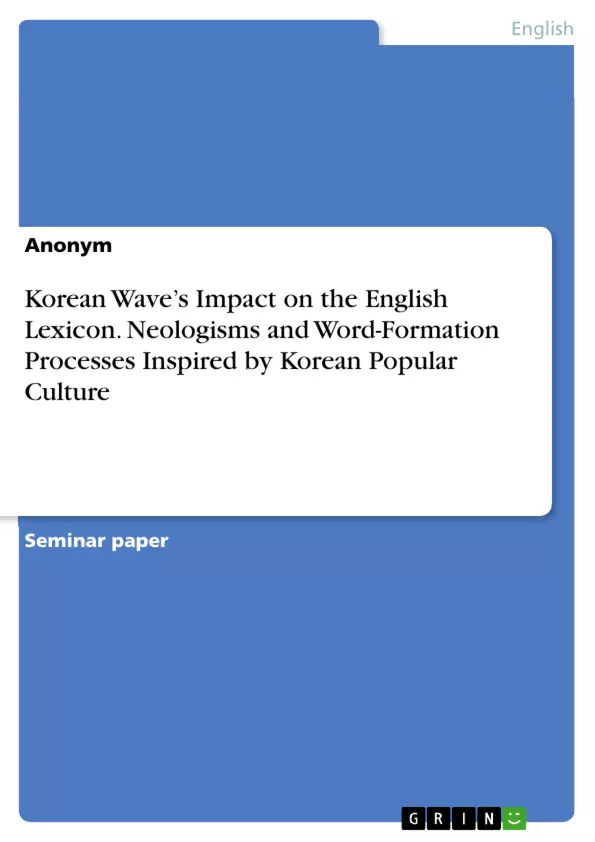This paper aims to critically analyze new words, or neologisms, related to the Korean Wave by addressing the following research question: How has the Korean Wave, through neologisms and word-formation processes, contributed to the enrichment of the English lexicon? In doing so, it will give insights into the field of morphology and the linguistic mechanisms that underlie the creation of new terms inspired by Korean popular culture.
The mobility of language and culture is more obvious as the world gets increasingly interconnected. The blending of linguistic elements from different cultures not only shows the powerful impact of global media on communication but also highlights the flexibility of language.
Diese Hausarbeit untersucht, wie der interkulturelle Austausch durch das Internet und das Phänomen der Koreanischen Welle, auch bekannt als Hallyu, die globale Sprachlandschaft verändert. Durch den weltweiten Erfolg von K-Pop, koreanischen Fernsehserien und anderen kulturellen Exporten aus Südkorea hat Hallyu nicht nur die Unterhaltungsindustrie revolutioniert, sondern auch die Sprache beeinflusst, indem neue Wörter und Begriffe geschaffen wurden.
Die Koreanische Welle hat seit dem späten 20. Jahrhundert ein enormes Interesse an der südkoreanischen Populärkultur geweckt und zeigt sich besonders in der Entstehung und Verbreitung von Neologismen. Diese neuen Wörter, die direkt von koreanischen Medien und Unterhaltung beeinflusst sind, haben sogar ihren Weg in den Oxford English Dictionary gefunden, was ihre Bedeutung und den kulturellen Einfluss unterstreicht.
Diese Hausarbeit analysiert kritisch die Neologismen im Zusammenhang mit der Koreanischen Welle und beantwortet die Forschungsfrage: Wie hat die Koreanische Welle durch Neologismen und Wortbildungsprozesse zur Bereicherung des englischen Lexikons beigetragen? Dabei werden Einblicke in die Morphologie und die linguistischen Mechanismen gegeben, die zur Schaffung neuer Begriffe inspiriert von der koreanischen Popkultur führen.
Inhaltsverzeichnis (Table of Contents)
- Introduction
- Theoretical Framework: Morphology
- Neologisms and Word-Formation Processes
- Derivation
- Compounding
- Conversion
- Clipping
- Blending
- Initialisms: Acronyms and Alphabetisms
- Back-Formation
- Coinage
- Borrowing
- The Korean Wave
- Methodology
- Results
- Discussion
- Conclusion
Zielsetzung und Themenschwerpunkte (Objectives and Key Themes)
This paper aims to critically analyze new words, or neologisms, related to the Korean Wave by addressing the research question: How has the Korean Wave, through neologisms and word-formation processes, contributed to the enrichment of the English lexicon? The paper will delve into the field of morphology and the linguistic mechanisms that underlie the creation of new terms inspired by Korean popular culture.
- The impact of the Korean Wave on the English lexicon
- Neologisms and word-formation processes inspired by Korean popular culture
- The role of morphology in understanding these lexical innovations
- The evolution of new words from nonce formations to lexicalization
- The increasing influence of global media on communication and language
Zusammenfassung der Kapitel (Chapter Summaries)
- Introduction: This chapter introduces the concept of the Korean Wave, or Hallyu, and its influence on language through the creation of new words. It highlights the increasing interest in South Korean popular culture and the impact of neologisms on English-speaking societies. The chapter also discusses the inclusion of Korean-origin terms in the Oxford English Dictionary, signifying the growing presence of Korean vocabulary in mainstream English.
- Theoretical Framework: Morphology: This chapter presents a theoretical framework for analyzing neologisms, exploring the field of morphology and its relevance to this research. It defines morphemes, word formation processes, and the various stages of neologism adoption within a speech community.
- Neologisms and Word-Formation Processes: This chapter delves into the different types of word-formation processes that create neologisms, including derivation, compounding, conversion, clipping, blending, initialisms, back-formation, coinage, and borrowing. It categorizes these processes based on their degree of productivity and explains the stages of neologism development from nonce formations to lexicalization.
- Derivation: This chapter examines derivation, the process of affixing morphemes to a base to produce new words. It distinguishes between prefixes and suffixes and their effects on the meaning and word class of a word.
- Compounding: This chapter explores compounding, the process of merging two or more free morphemes to form a new word. It discusses the various combinations of word classes in compound words and the different spelling forms they can adopt. It also categorizes compounds based on their semantic heads.
Schlüsselwörter (Keywords)
The main keywords and focus topics of this paper are the Korean Wave, neologisms, word-formation processes, morphology, lexical innovation, linguistic change, global media, and cultural influence. This paper aims to explore the impact of Korean popular culture on the English language, examining the linguistic mechanisms behind the creation and adoption of new words inspired by the Korean Wave.
- Quote paper
- Anonym (Author), 2023, Korean Wave’s Impact on the English Lexicon. Neologisms and Word-Formation Processes Inspired by Korean Popular Culture, Munich, GRIN Verlag, https://www.grin.com/document/1481743



